
With over 3.07 billion monthly active users, Facebook is the social media world’s heavyweight champion. While best known as the platform where your high school friends and their parents hang out, it’s much more than that: it’s fertile ground for law firms to build brand awareness and generate new leads.
I’ve seen firsthand how Facebook ads can transform a legal practice. It’s the perfect place to advertise consumer-focused legal services like personal injury, family law, and criminal defense as it gets you in front of the specific demographics that make up your client base.
The ability to target based on interests and behaviors makes it a cost-effective alternative to traditional advertising methods.
Whether you’re considering Facebook advertising for your law firm for the first time or are looking to improve your current ads, you’re in the right place.
In this blog, you’ll find:
Let’s begin.
Facebook advertising is an indispensable law firm marketing strategy. With cutting-edge targeting options, it’s a cost-effective way to place your firm right in front of those who need your services most.
I use Facebook’s network to connect my clients with their audiences precisely when they’re scrolling. The power of Facebook lies in its ability to reach people in their everyday environments — on mobile phones and desktops, across Instagram, Messenger, and Facebook.
For law firms, this means the ability to reach clients when and where they’re most engaged, whether that’s during a lunch break, on a commute, or at the end of the day.
When you create ads that resonate, you can foster genuine engagement and build relationships with potential clients. Your ads appear in the feeds where your audience already spends time and are memorable and relevant, making them more likely to convert.
Facebook gives advertisers unmatched targeting capabilities, allowing us to focus our efforts exactly where they’re most impactful. With options to pinpoint demographics like age, gender, and education or to target specific geographic locations, I make sure our client’s ads reach the precise audiences most valuable to their law firm’s growth.
Facebook’s interest- and behavior-based targeting is more sophisticated than ever in 2025. Law firms can engage users based on preferences, browsing behaviors, and even life events like marriage, relocation, or recent career changes.
For example, a family law firm might focus on users who have recently updated their marital status — an indicator of potential legal needs.
Facebook’s algorithm has evolved to prioritize relevance, evaluating each post, ad, Story, and Reel based on how well it aligns with user interests. This shift means that the more closely an ad matches a user’s needs, the more likely it is to appear prominently in their feed. With that said, it’s more important than ever to create engaging and relevant ads
These options allow me to fine-tune each ad to connect with audiences who are not only interested in legal services but are also primed for conversion.
Setting clear objectives for your law firm’s Facebook ad campaigns is crucial for their success. These objectives should not only align with your broader law firm marketing goals but also demonstrate a clear path to achieving them.
Identifying your goals is your first step.
Do you want to drive traffic to your law firm’s website or a dedicated landing page?
Whatever it is, each goal requires a tailored approach and specific ad format to meet your desired outcome.
Facebook Ads gives you options when creating your campaign to select a goal that roughly aligns with what I previously mentioned. To start, click “Create” in your ads manage to begin creating a new campaign.
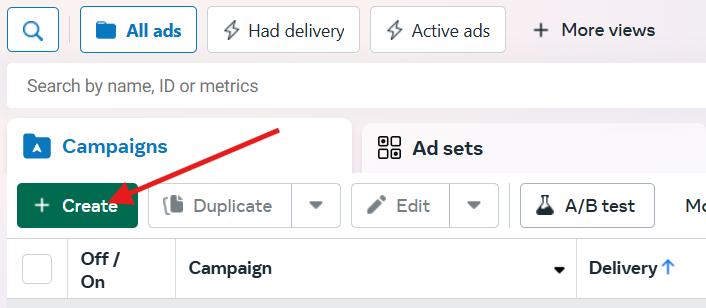
Then you’ll get a list of goals.
For most law firms, Awareness, Traffic, Engagement, and Leads are the primary objectives to consider. Each serves a different part of the sales funnel — from generating awareness and engaging the audience to capturing leads for conversion.
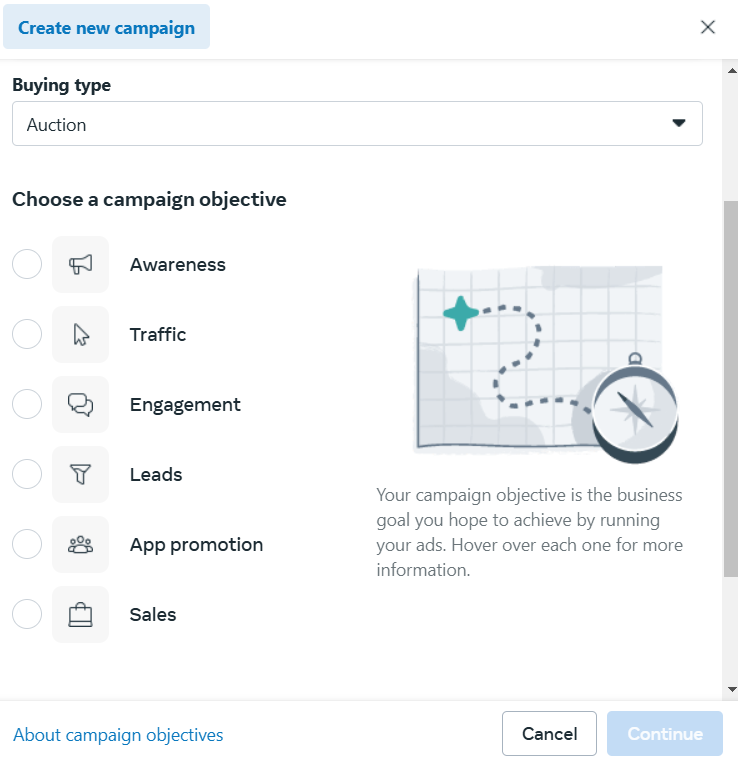
Choosing a campaign objective that aligns with your goals enables Facebook to configure ads that deliver meaningful results, rather than superficial metrics.
Implementing SMART goals — Specific, Measurable, Achievable, Relevant, and Time-bound — provides a structured framework that helps you focus in on your objectives. For example, aiming to increase consultations for your family law practice by 15% over the next quarter is a SMART goal.
Here’s how that goal would break down into a SMART goal:
Research supports the effectiveness of SMART goals. A study by Dr. Gail Matthews found that individuals who wrote down their goals, developed action plans, and provided weekly progress updates to a friend achieved a 76% success rate in reaching their objectives. This is a 33% increase compared to those with unwritten goals, who had a 43% success rate.
This evidence underscores the value of setting clear, structured goals.
Facebook’s Advantage+ Audience and Audience Controls provide options for law firms to target their ads with precision, helping connect with relevant audiences.
By leveraging these features, law firms can refine their approach, ensuring ads reach people most likely to need their services. And it’s easy to get started, as Advantage+ is AI-driven, so you don’t need advanced knowledge of the ads process.
However, as useful as these tools are, there are some limitations to keep in mind.
Creating custom audiences can help you re-engage specific individuals, like past clients or leads who have interacted with your law firm. By uploading a client list, you can reach these contacts directly, strengthening relationships and building loyalty.
For expanding outreach, Lookalike Audiences provides a way to connect with new prospects who share characteristics with the existing client base.
Enter Mary Sue, your ideal client. She’s a serial dater who’s on her third divorce — the perfect client for a divorce attorney. Lookalike Audiences gets your ads in front of more Mary Sue’s, rather than a generic pool of people who may or may not be good prospects.
The Advantage+ Audience feature uses Facebook’s algorithm to automatically identify users matching a target profile, prioritizing traits like age and location based on initial suggestions. This tool is designed to optimize reach for relevance and performance, but it also introduces a layer of automation that limits the advertiser’s control.
Law firms may find this lack of transparency challenging if they want more direct input on who sees their ads.
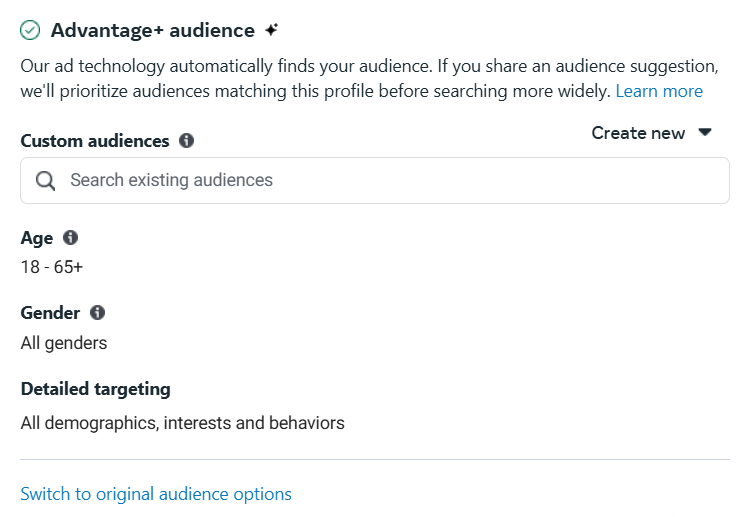
Audience Controls offer customization options like locations, age ranges, languages, and exclusions for specific audiences. Law firms can use these controls to narrow their reach to specific regions, such as targeting potential clients within a set radius around the office.
For example, targeting a 10-mile radius can be beneficial for firms focused on local services, ensuring ads are relevant to nearby audiences.
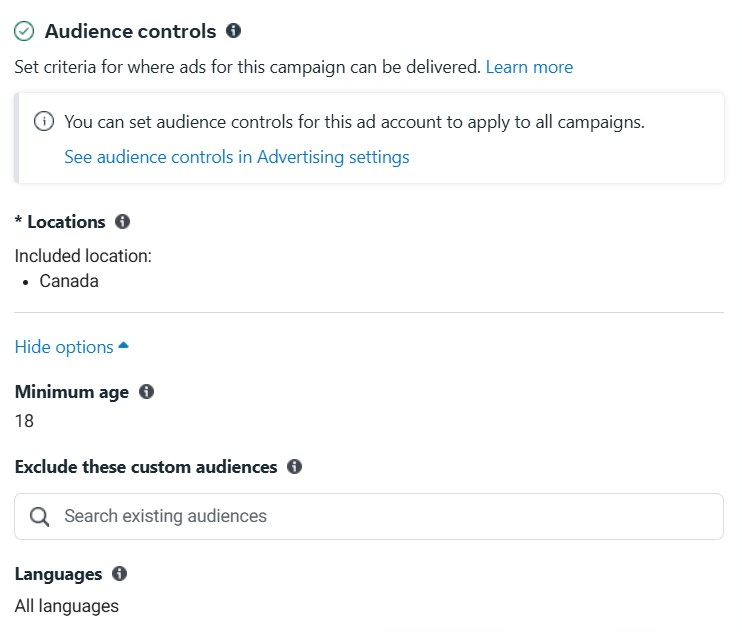
However, relying on algorithmic tools like Advantage+ Audience means that law firms are somewhat dependent on Facebook’s data interpretations, which may not always align perfectly with the firm’s unique audience needs.
With Facebook’s Audience Controls feature, law firms can go a step further by excluding certain audiences from their ads.
For example, if you want to focus on new clients, you can exclude current clients or those who have already engaged with previous campaigns. This helps ensure your ads are seen by the people you most want to reach, without wasting resources on those who aren’t in need of your services.
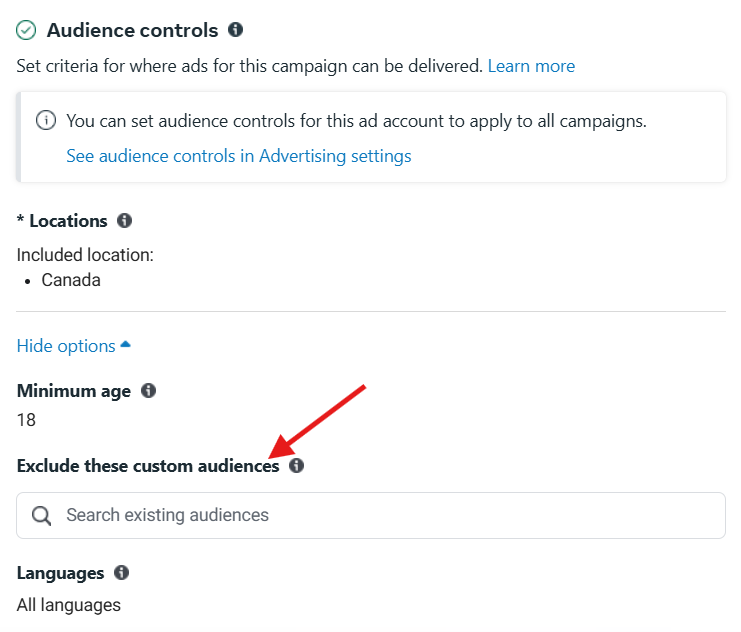
Exclusion targeting is particularly useful for managing ad spend and keeping campaigns focused. By using exclusions, law firms can create more efficient campaigns that reach only the most relevant prospects, increasing the likelihood of meaningful engagement and better results.
Engaging content is vital for turning potential clients into actual customers. By understanding the sales funnel, you’ll be more in tuned with that your audience wants to see. Then, you can make ads that resonate with prospects at each stage.
Creating tailored content for each stage of the sales funnel helps you reach your audience no matter where they’re at.
At the top of the funnel, focus on building awareness. This is typically someone’s introduction to your law firm. Introduce your firm and position yourself as a helpful resource.
Consider producing educational videos that answer frequently asked legal questions or break down complex processes in a simple, approachable way. Video content typically generates higher engagement than static posts, making it a great choice for capturing initial interest.
In the middle of the funnel, shift to nurturing that interest by providing in-depth content that showcases your expertise. I recommend sharing case studies that highlight your experience and successful case outcomes. This stage is all about building trust and demonstrating your value, giving potential clients a reason to keep you in mind as they consider their options.
Finally, at the bottom of the funnel, the focus is on motivating action. Here, it’s essential to provide clear, compelling offers that reduce hesitation — like a free consultation.
Here’s a great example.
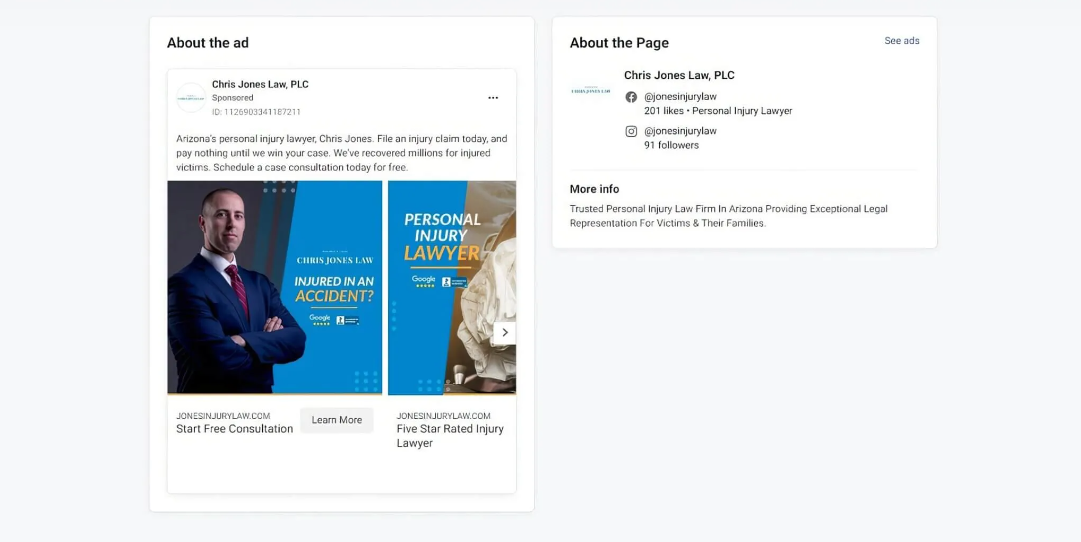
No matter what funnel you’re creating content for, there are a few best practices to follow.
For instance, include stories showcasing how you’ve resolved cases similar to theirs.
Finding out what grabs your audience’s attention is key to running effective ads. Facebook’s split-testing (A/B testing) feature lets you test different versions of your ads to see which ones get the best response.
What to Test: Split testing allows you to experiment with different parts of your ad, like:
Once your ads are up and running, keep an eye on key performance indicators (KPIs) like click-through rates and conversions.
For example, if you’re promoting your free consultations, one ad version might highlight a divorce case as an example, while another emphasizes empathy and support. You can then compare the two to see which approach resonates better with your audience.
People need more interactions with a brand before they’re ready to make a decision. In fact, a study by RAIN Group found that it takes an average of eight touchpoints to secure an initial meeting with a potential client.
Think about it: someone might see your law firm’s ad, click through to your website, but leave without booking a consultation simply because they weren’t ready yet. That’s where retargeting comes in. By showing them your ad again, you remind them of your services at just the right time, making them more likely to take action.
Retargeting is a powerful way for law firms to reconnect with warm leads, keeping your firm top of mind and helping potential clients move closer to making a decision.
The Meta Pixel is the key to making retargeting work. This simple piece of code tracks what visitors do on your website, helping you create custom audiences based on their behavior.
For example, if someone checks out your estate planning page but doesn’t schedule a consultation, the Meta Pixel lets you show them ads specifically about estate planning. It’s a subtle reminder that keeps your services on their radar for when they’re ready to take the next step.
Setting up the Meta Pixel is easier than it sounds. I’ve included a video below to guide you through the process step by step. Once it’s installed, you’ll have everything you need to reconnect with warm leads and turn interest into action.
Retargeting works best when you tailor your ads to where potential clients are in their decision-making journey.
That said, retargeting isn’t always the best approach for lawyers. In practice areas like family law, criminal defense, or personal injury, seeing ads pop up repeatedly could feel invasive or embarrassing for clients — especially if they share a device with others. In these cases, it’s better to consider more subtle ways to stay on their radar, like email follow-ups or ads with broader messaging.
The key is finding the right balance. By crafting thoughtful, well-timed ads and being mindful of your audience’s situation, you can use retargeting to re-engage potential clients without overstepping.
Using the right mix of ad formats and carefully managing how often they’re seen can make a huge difference in how your law firm’s Facebook ads perform.
Facebook has several ad formats to choose from that can all connect you with clients in different ways. The key is to understand what each format does and how it can support your law firm’s goals.
Lead Form Ads and Video Ads tend to perform the best for law firms. Lead forms make it easy for potential clients to take immediate action and schedule a consultation, while videos help establish trust and showcase your expertise. Carousel ads are also a solid choice if your firm specializes in multiple practice areas and wants to highlight its versatility.
To make these ads even more effective, focus on two key factors: optimizing for mobile and managing frequency.
When your ads are mobile-optimized, thoughtfully timed, and strategically chosen, they feel natural and engaging. This builds trust and helps move potential clients closer to reaching out to your firm.

“My website continues to dominate all the top website searches in my industry and my business has grown 10-fold as a result.”
Oykhman Criminal Defence
Keeping tabs on how your Facebook ads are performing is how you get the best results. Focus on the right metrics and make thoughtful adjustments to make the most of your advertising efforts.
These key metrics give you a clear picture of what’s working and where there’s room to improve:
Once you’ve got a handle on the numbers, the next step is using that information to make smart changes. Facebook’s analytics tools let you see which audiences respond best to your ads.
If a certain age group or location is more engaged, you can shift your budget toward those groups to make a bigger impact.
When advertising on Facebook, law firms must follow ethical guidelines set by the American Bar Association (ABA) and their state bar associations to maintain trust and professionalism. According to the ABA’s Model Rules of Professional Conduct, particularly Rule 7.1, lawyers must avoid making “false or misleading communications” about their services.
Here are a few key considerations to keep your Facebook ads both effective and ethical:
Staying compliant means regularly reviewing both ABA rules and your state’s specific guidelines, as these can differ or change over time. Following these standards not only keeps your ads ethical but also helps uphold the integrity of the legal profession while building trust with potential clients.
Facebook advertising offers law firms a powerful way to connect with potential clients, but success requires a thoughtful approach.
By targeting the right audience, creating engaging content, and staying flexible with your strategies, you can make the most of your campaigns. Don’t forget to prioritize ethics and transparency to build trust.
Ready to maximize your marketing budget? Fill out the contact form or call us today for a complimentary consultation. We will listen to your story, work to define your business objectives, and recommend an approach to deliver maximum ROI for your firm.
By using this website, you consent to our use of cookies in accordance with our Cookie Policy. Cookies help us enhance your browsing experience and provide personalized content. If you do not agree to our use of cookies, please adjust your browser settings accordingly.